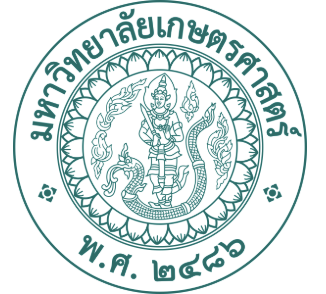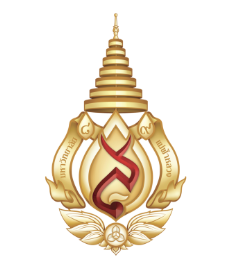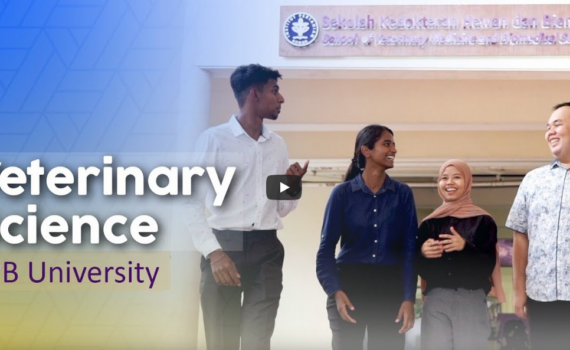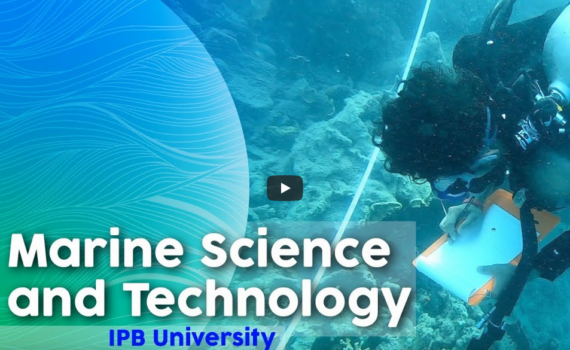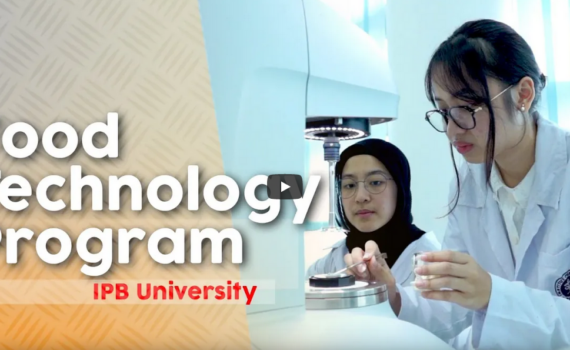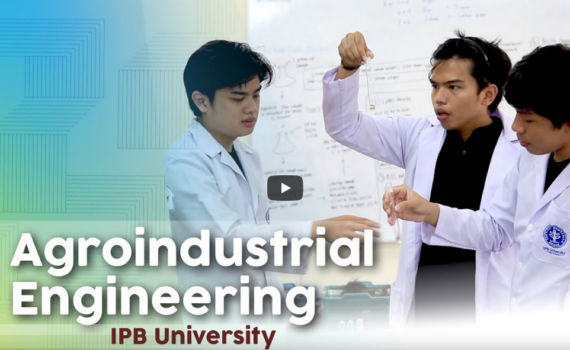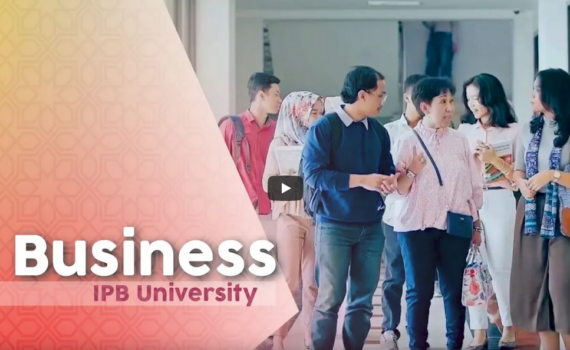International Undergraduate Programs
The International Undergraduate Program (IUP) at IPB University offers high-quality education tailored to international standards. The program focuses on agriculture, natural sciences, and other related fields, providing an academic experience that blends global competence with local relevance.
IUP attracts students from both Indonesia and abroad, offering a multicultural learning environment supported by excellent faculty, research-based learning, and strong international partnerships.
List of International Undergraduate Program
-
Faculty of Agriculture
-
School of Veterinary Medicine and Biomedical Sciences
-
Faculty of Fisheries and Marine Science
-
Faculty of Animal Science 🆕
-
School of Engineering
-
Faculty of Mathematics and Natural Sciences
-
Faculty of Economics and Management
-
School of Business
The Faculty of Agriculture at IPB University (Institut Pertanian Bogor) is one of the university’s oldest and most prominent faculties. Established in 1941, it serves as the cornerstone of IPB University’s reputation as a leading institution in agricultural sciences and research in Indonesia and the region. The faculty is dedicated to addressing challenges in food security, sustainable agriculture, and environmental stewardship.
🌿 Smart Agriculture
| Learning Outcomes | Partner | Estimated Fees (at Partner University) |
Detailed Information *Click the logo |
|---|---|---|---|
| ✔️ Able to apply and utilize science and technology in the field of smart agriculture in solving problems and adapting to the situation at hand.
✔️ Mastering theoretical and technical concepts in the field of smart agriculture in depth for problem-solving. ✔️ Able to make the right decisions and provide alternative solutions following the analysis of textual and spatial data information. |
Gyeongsang National University, South Korea |
Tuition: ~USD 850/semester Living: ~USD 1,250/month (Covered for selected students) |
School of Veterinary Medicine and Biomedical Sciences (SVMBS) at IPB University is a premier institution in Indonesia, focusing on education, research, and community service in veterinary medicine and biomedical sciences. The school plays a critical role in improving animal health, ensuring public health, and advancing research in biomedical sciences.
🐾 Veterinary Sciences
| Learning Outcomes | Partner | Estimated Fees (at Partner University) |
Detailed Information *Click the logo |
|---|---|---|---|
|
✔️ Mastering theoretical concepts in marine hydrobiology, oceanography, underwater acoustics, marine instrumentation and robotics, remote sensing, and AI for marine resource/environment problem solving. ✔️ Apply the latest marine science and technology to explore marine resources and contribute to the blue economy. ✔️ Initiate innovations for exploration, development, and sustainable marine utilization. |
🏛️ University of Gottingen
🏛️ University of Giessen 🏛️ University of Munich 🏛️ University of Hannover 🏛️ University of Edinburgh 🏛️ Utrecht University 🏛️ University of Miyazaki 🏛️ Tokyo University 🏛️ Yamaguchi University 🏛️ Obihiro University 🏛️ Nagoya University 🏛️ Hokkaido University 🏛️ Queensland University 🏛️ Sydney University 🏛️ Universiti Putra Malaysia 🏛️ Universidade Nacional Timor Lorosa’e |
To be confirmed |
The Marine Science and Technology Program is an academic discipline that focuses on understanding, conserving, and sustainably managing marine environments and their resources. At IPB University, this program is housed within the Faculty of Fisheries and Marine Sciences, a leading institution in Indonesia for education and research on tropical marine ecosystems.
🌊 Marine Science and Technology
| Learning Outcomes | Partner | Estimated Fees (at Partner University) |
Detailed Information *Click the logo |
|---|---|---|---|
|
✔️ Mastering theoretical concepts in marine hydrobiology, oceanography, underwater acoustics, marine instrumentation and robotics, remote sensing, and AI for marine resources and environment problem solving.
✔️ Apply the latest marine science and technology to explore marine resources and contribute to growing the blue economy.
✔️ Initiate innovations for exploration, development of marine utilization, and sustainable advancement. |
🏛️ Universiti Malaysia Terengganu
🏛️ National Sun Yat Sen University 🏛️ Chiba University 🏛️ Yamaguchi University 🏛️ The Hong Kong University of Science 🏛️ Victoria University of Wellington |
💰 Tuition Fees: Based on host university regulations 💰 Estimated Living Costs: |
The Animal Production Technology Study Program at IPB University is a distinguished academic program dedicated to producing skilled and knowledgeable graduates capable of managing and advancing the livestock industry. It emphasizes mastery of animal production technologies, waste management, and product handling, while upholding key principles such as animal welfare, genetic resource conservation, and environmental sustainability. Supported by a comprehensive curriculum, the program equips students to face real-world challenges in animal science and agribusiness, making it highly relevant for careers in these fields.
Animal Production Technology
| Learning Outcomes | Partner | Estimated Fees (at Partner University) |
Detailed Information *Click the logo |
|---|---|---|---|
| ✔️ Able to identify and analyze problems, find alternative solutions, and select the best solution in livestock production systems ✔️ Able to identify livestock production quality based on genetic, physiological, and physical aspects using conventional or biotechnological approaches ✔️ Capable of managing livestock businesses to achieve maximum production and high product quality in sustainable agriculture ✔️ Able to understand and apply livestock production technologies, livestock product handling, and livestock waste management ✔️ Able to understand, apply, and identify livestock characteristics, genetic potential, and their applications ✔️ Able to communicate effectively both orally and in writing, with a curiosity to develop science and technology in the field of livestock production and technology ✔️ Able to evaluate sustainable production processes |
🏛️ Universiti Putra Malaysia 🏛️ Murdoch University, Australia 🏛️ Wisconsin University, USA 🏛️ Erciyes University, Turkey 🏛️ Guangxi University, China 🏛️ Can Tho University, Vietnam |
To be confirmed |
The Faculty of Agricultural Engineering and Technology at IPB University is a leading academic institution that integrates science, technology, and innovation to advance agricultural productivity, sustainability, and industrial processes. This faculty plays a vital role in addressing the challenges of modern agriculture and agro-industry, focusing on the application of technology in various agricultural fields.
Food Science and Technology
| Learning Outcomes | Partner | Estimated Fees (at Partner University) |
Detailed Information *Click the logo |
|---|---|---|---|
|
✔️ Understand food science principles: chemistry, microbiology, safety, engineering, nutrition, sensory science, and laws. ✔️ Apply principles to produce safe and quality foods. ✔️ Communicate technical and non-technical food production topics. ✔️ Think critically, solve problems, and make informed decisions. ✔️ Work in diverse teams and adapt to different situations. ✔️ Commit to professionalism and ethics. |
🏛️ Universiti Teknologi MARA 🏛️ Universiti Sains Malaysia 🏛️ Universiti Putra Malaysia 🏛️ Universiti Malaysia Terengganu 🏛️ Mae Fah Luang University 🏛️ Kasetsart University 🏛️ King Mongkut’s Institute of Technology Ladkrabang 🏛️ Hiroshima University 🏛️ Hokkaido University 🏛️ Ibaraki University 🏛️ Tsukuba University 🏛️ Tokyo University of Agriculture and Technology 🏛️ Sophia University 🏛️ BOKU University 🏛️ Warsaw University of Life Sciences |
To be confirmed |
Agro-Industrial Engineering
The Faculty of Mathematics and Natural Sciences (FMIPA) at IPB University is a center of excellence in the fundamental sciences, providing a strong foundation for interdisciplinary research and innovation. This faculty is pivotal in supporting advancements in agriculture, environmental sciences, and biotechnology through its expertise in mathematics, natural sciences, and computational methods.
🧪 Chemistry
| Learning Outcomes | Partner | Estimated Fees (at Partner University) |
Detailed Information *Click the logo |
|---|---|---|---|
|
✔️ Able to relate the structure and the universe systematically through observation and experimentation that utilizes science and technology as an application of basic science, including mathematics, physics, chemistry, and biology. ✔️ Able to describe the theoretical concepts of structure, properties, and changes in kinetics and thermodynamics, identification, separation, characterization, transformation, material synthesis, and their applications. ✔️ Able to use material knowledge and develop management systems that have been implemented in industry widely, including ISO, HACCP, K3, and halal assurance systems. ✔️ Able to organize standard operations of the function and operation of chemical instruments, and analyze data and information to produce appropriate conclusions. ✔️ Able to use software for analysis, synthesis, and molecular modeling in the field of chemistry. ✔️ Able to demonstrate good practical work in the laboratory to support theoretical aspects by paying attention to safety, occupational health, and environmental aspects. ✔️ Able to solve science and technology problems in the field of chemistry, including identification, analysis, isolation, transformation, and synthesis of simple materials through the application of knowledge of structure, properties, molecular changes, kinetics, and thermodynamics. ✔️ Able to show an attitude of devotion to God Almighty; uphold human values; contribute to improving the quality of community life; proud and love the country; appreciate diversity; able to work together; law-abiding and disciplined; internalize values, norms, and ethics; responsible; internalize the spirit of independence, struggle, and entrepreneurship. ✔️ Able to communicate orally and in scientific writing; interpret, process, and present data; demonstrate skills in numeracy and mathematical thinking; demonstrate skills in problem solving; demonstrate an attitude of ethical responsibilities; do sourcing information, team working, and time management well; demonstrate soft skills such as organizational skills, creativity, and leadership. |
🏛️ Universiti Putra Malaysia 🏛️ Universiti Teknologi Malaysia 🏛️ International Islamic University Malaysia 🏛️ Universiti Sains Malaysia 🏛️ Universiteit Leiden 🏛️ National University of Singapore 🏛️ Nanyang Technological University 🏛️ Kyoto University 🏛️ Osaka University 🏛️ Nagoya University 🏛️ Gifu University 🏛️ Ehime University 🏛️ Shinshu University 🏛️ Bath University 🏛️ National Chiayi University |
To be confirmed |
|
🌿 Biology
| Learning Outcomes | Partner | Estimated Fees | Detailed Information *Click the logo |
|---|---|---|---|
|
✔️ Able to make appropriate decisions based on data and information analysis, and able to guide in choosing various alternative solutions independently and in groups in the fields of biodiversity, environment, and biotechnology. ✔️ Mastering theoretical concepts in the field of biology in general and theoretical concepts in the fields of biodiversity, environment, and biotechnology, and able to formulate procedural problem-solving based on the theoretical concepts mastered. ✔️ Able to apply biological expertise and utilize science and technology in problem solving in the fields of biodiversity, environment, and biotechnology, and be able to adapt to the situation at hand. ✔️ Able to apply scientific values and values contained in state agreements in life. ✔️ To be an agile, collaborative, and adaptive individual to change. ✔️ Become a lifelong learner ✔️ Able to take responsibility for one’s work in the field of Biology and can be given responsibility for the achievement of the work of his/her organization ✔️ Able to self-evaluate, manage one’s learning, and effectively communicate information and ideas in various forms of media as appropriate. |
🏛️ Universiti Putra Malaysia 🏛️ Universiti Teknologi Mara 🏛️ Kasetsart University 🏛️ Kyoto University 🏛️ Tottori University 🏛️ Okayama University 🏛️ Gyeongsang National University 🏛️ University of Nottingham 🏛️ University of Göttingen 🏛️ Leipzig Zurich 🏛️ University of Zurich 🏛️ Zagreb University |
To be confirmed |
The Faculty of Economics and Management (FEM) at IPB University is a leading institution that combines economics, business, and management expertise to address global and local challenges, particularly in agriculture, natural resources, and rural development. The faculty emphasizes sustainability, innovation, and entrepreneurship, preparing graduates to become leaders in economic and managerial fields.
Management
| Learning Outcomes | Partner | Estimated Fees (at Partner University) |
Detailed Information *Click the logo |
|---|---|---|---|
|
✔️ Communicate effectively, demonstrate integrity, ethics, and teamwork. ✔️ Apply management tools and IT for sustainable solutions. ✔️ Develop critical, creative, and innovative thinking with sociotechnopreneurship. ✔️ Implement core management functions. ✔️ Make decisions, solve problems, and manage risks. ✔️ Execute strategic management within digital transformation. ✔️ Compete and adapt nationally and globally. |
🏛️ International Islamic University Malaysia 🏛️Universiti Kebangsaan Malaysia |
To be confirmed |
Agribusiness
| Learning Outcomes | Partner | Estimated Fees | Detailed Information *Click the logo |
|---|---|---|---|
|
✔️ Think critically to solve tropical agribusiness issues. ✔️ Analyze domestic and global agribusiness environments. ✔️ Communicate and present business ideas effectively. ✔️ Construct tropical agribusiness business plans. ✔️ Identify agribusiness systems from multiple perspectives. ✔️ Understand ethical perspectives on agribusiness. ✔️ Possess data, technology, and human literacy. ✔️ Exhibit creativity, entrepreneurship, and leadership. ✔️ Work and produce individually and in teams. |
🏛️ Universiti Putra Malaysia
🏛️ International Islamic University Malaysia 🏛️ Universiti Kebangsaan Malaysia |
To be confirmed |
Resources and Environmental Economics
| Learning Outcomes | Partner | Estimated Fees | Detailed Information *Click the logo |
|---|---|---|---|
|
Attitude General Skills Knowledge Special Skills |
🏛️ Universiti Putra Malaysia 🏛️ International Islamic University Malaysia 🏛️ Universiti Kebangsaan Malaysia |
To be confirmed |
Islamic Economics
The School of Business (SB) at IPB University is a distinguished institution that focuses on producing innovative, ethical, and entrepreneurial leaders equipped to navigate the complexities of the global business environment. The school emphasizes sustainable business practices, innovation, and the integration of technology into business operations, making it particularly relevant for agribusiness and industries connected to natural resources.
Business
| Learning Outcomes | Partner | Estimated Fees (at Partner University) |
Detailed Information *Click the logo |
|---|---|---|---|
| ✔️ Capable of identifying and recognizing business opportunities ✔️ Mastering business and entrepreneurship knowledge to develop innovative business models ✔️ Formulating appropriate business plans ✔️ Solving business problems both strategically and operationally ✔️ Integrating theories and best practices to enhance competitiveness ✔️ Using decision-support tools to address business issues ✔️ Demonstrating dynamic leadership in organizational functions ✔️ Working effectively in teams ✔️ Communicating arguments effectively in verbal and written formats ✔️ Understanding the role of innovation in sustainable value creation ✔️ Practicing ethical business conduct ✔️ Balancing stakeholders’ interests to ensure business sustainability |
🏛️ Universiti Sains Malaysia 🏛️ Universiti Utara Malaysia 🏛️ Putra Business School 🏛️ Universiti Sultan Zainal Abidin 🏛️ Kirirrom Institute of Technology 🏛️ Tokyo University of Agriculture 🏛️ North Dakota State University 🏛️ Fordham University 🏛️ Adam Smith Business School 🏛️ University of Glasgow 🏛️ Maastricht School of Management 🏛️ University of Zagreb 🏛️ Hochschule Bremen City University of Applied Sciences 🏛️ Warsaw University of Life Sciences |
Tuition Fees: Waived Living Costs: 🌍 Bremen, Germany: 🌍 UUM, Malaysia: Other Fees (UUM): Note: Visa, airfare, and e-VAL fees vary depending on the destination country. |
How to Apply?
Joint Degree for Undergraduate Program
-
Undergraduate Program
IPB University offers joint degree for undergaduate progam:
